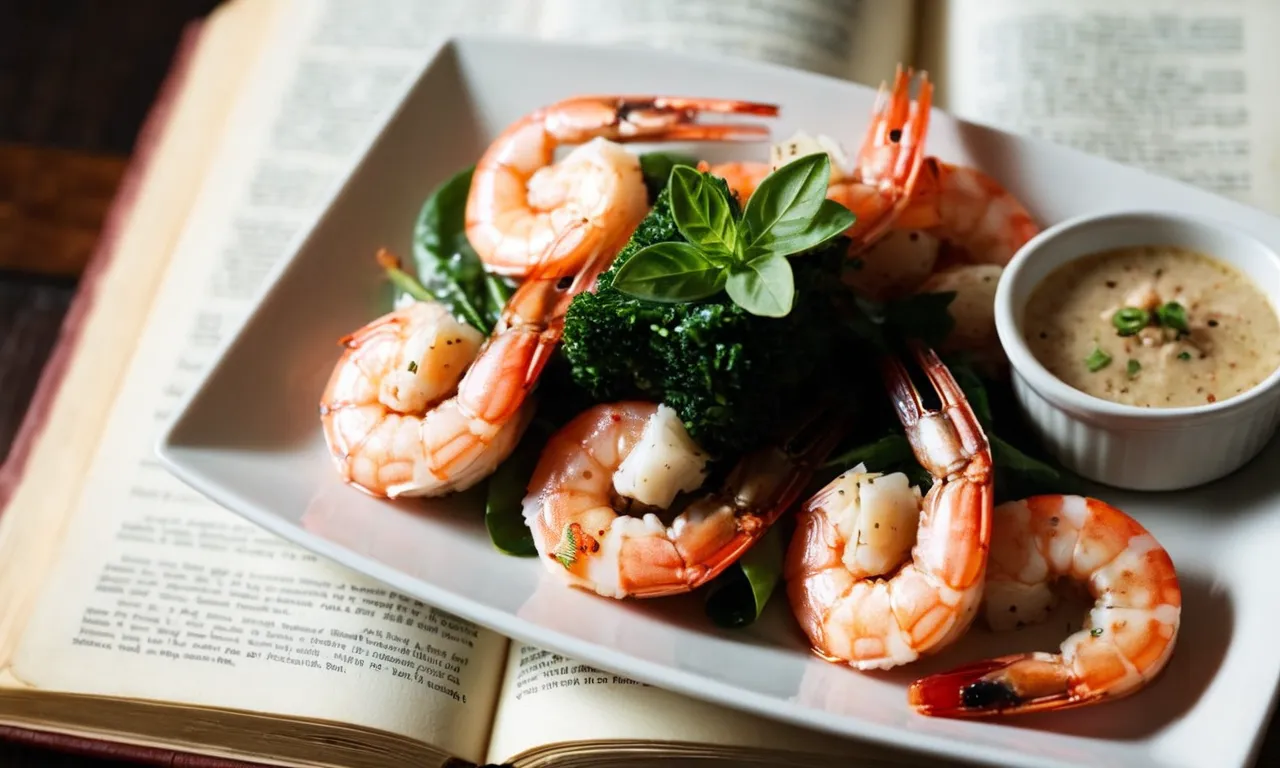What Does The Bible Say About Eating Shrimp?
Craving some shrimp scampi or shrimp salad but unsure about what the Bible says regarding shellfish? You’re not alone. Many Christians wonder if eating shrimp and other shellfish is biblically allowed or forbidden.
In this comprehensive guide, we’ll walk through the key biblical passages about eating shrimp, examine the historical context, and help you understand the principles behind the biblical dietary restrictions regarding shellfish.
If you’re short on time, here’s a quick answer: The Bible does not expressly forbid eating shrimp in the New Testament. Although Leviticus 11:9-12 prohibits the consumption of shrimp and other shellfish for ancient Israelites, scholars generally agree this no longer applies to Christians today.
The Old Testament Passages on Eating Shellfish
Leviticus 11:9-12 – Clean and Unclean Animals
In Leviticus 11:9-12, God instructs the Israelites on which animals are clean and unclean to eat. Specifically, verse 10 states, “But anything in the seas or the rivers that does not have fins and scales, of the swarming creatures in the waters and of the living creatures that are in the waters, is detestable to you.”
This includes shellfish like shrimp, lobster, crabs, and oysters which do not have fins or scales.
This law served several purposes for the ancient Israelites. First, it taught them to exercise self-control and obedience to God’s laws. Second, it kept them ceremonially clean and set apart from other nations.
Third, it prevented certain health risks from eating shellfish in a hot climate without modern refrigeration. So while the law had spiritual meaning, it also had practical effects.
Deuteronomy 14:9-10 – Clean and Unclean Sea Creatures
Deuteronomy 14:9-10 reiterates the instructions from Leviticus, stating, “These you may eat, of all that are in the waters. Everything in the waters that has fins and scales, whether in the seas or in the rivers, you may eat.
But anything in the seas or the rivers that does not have fins and scales, of the swarming creatures in the waters and of the living creatures that are in the waters, is detestable to you.”
Again, this served to teach the Israelites obedience and reinforce ritual cleanliness. By avoiding certain sea creatures, they learned to trust and follow God’s guidelines. The Gill’s Exposition notes that this showed “the distinction between the Jews and other nations” as God set them apart through these dietary restrictions.
Were the Old Testament Dietary Laws for Health or Holiness?
The Hygienic View
Some believe that the dietary restrictions outlined in the Old Testament were intended primarily for health reasons. At the time, certain meats like pork and shellfish were more likely to carry parasites and disease in the warm Middle Eastern climate.
Avoiding these foods reduced the risk of food poisoning and infection.
This hygienic view argues that God, in His wisdom, gave the Israelites these laws to protect them physically. By following the kosher diet, the Israelites would become stronger and healthier, better able to fulfill their covenantal duties towards God.
While practical health concerns may have played a role, most scholars believe there is more to the story. The ceremonial aspects of the Mosaic Law point towards deeper spiritual meanings behind the dietary code.
The Ceremonial View
More than just physical health, the kosher laws had a symbolic, spiritual purpose. They were given by God to make His people holy, separate from the world around them.
The laws taught reverence for life by what could and could not be eaten. The clean animals chewed their cud and had split hooves, while the unclean crawled on the ground or lived in water. This taught care and concern for God’s creation.
In calling one group of animals clean and another unclean, God was illustrating spiritual truths. He was showing the difference between righteous and wicked, holy and profane, clean and unclean.
So the kosher code had significance beyond just diet and health. It had moral, ethical and theological implications for Israel’s calling as God’s chosen nation.
How Did Jesus Fulfill the Law?
When Jesus came to earth, he did not come to abolish the Law of Moses but to fulfill it (Matthew 5:17). Through his life, death, and resurrection, Jesus perfectly obeyed and fulfilled the righteous requirements of the law on our behalf. Here are some key ways Jesus fulfilled the law:
He Lived a Sinless Life
Jesus fulfilled the moral and ethical aspects of the law by living a sinless life (Hebrews 4:15). Though tempted in every way, Jesus never sinned, meeting the perfect standard of obedience the law required.
He Bore our Sin and Curse
Jesus also fulfilled the law’s penalty for sin by dying on the cross for sinners. The law required death for those who disobeyed God’s commands (Romans 6:23). But Jesus took our sin and curse upon himself, dying in our place (Galatians 3:13).
He Cancelled Regulations and Rituals
The Old Testament law contained many rules and rituals regarding diet, festivals, sacrifices, and more. Jesus made these regulations obsolete, declaring all foods clean (Mark 7:19) and fulfilling the meaning behind the sacrificial system once and for all as the final sacrifice (Hebrews 10).
He Unveiled True Righteousness
The law was ultimately intended to lead people to Jesus by showing them their sin and need for a Savior (Galatians 3:24). By perfectly fulfilling the righteous demands of the law, Jesus enables all who have faith in him to receive the gift of his righteousness (Romans 3:21-22).
The external rule-keeping of the law is replaced by the inward transformation of the Holy Spirit who empowers believers for obedience (Jeremiah 31:33).
So while Jesus did not come to abolish the law, he ushered in a new covenant in which the requirements of the law are fulfilled by the power of the Spirit rather than through external rule-keeping. Jesus is the ultimate goal, purpose and fulfillment of the law, empowering the believer to bear Christlike character fruit that surpasses mere rule adherence.
What Do the New Testament Passages Say About Food and Dietary Laws?
Mark 7:1-23 – It’s Not What Goes In that Defiles
In Mark 7:1-23, Jesus has an interaction with the Pharisees and scribes about eating with unwashed hands. Jesus tells them that it’s not what goes into a person that defiles them, but rather what comes out of their heart.
He declares all foods clean and states that what really matters is the condition of a person’s heart and mind.
This passage makes it clear that Christians are not bound by the Old Testament food laws. What matters most is having a pure heart before God, not ritual cleanness or avoiding certain foods. According to Jesus, no food is unclean or defiling in and of itself.
Acts 10 – Peter’s Vision and Cornelius
In Acts 10, God gives Peter a vision of a sheet containing unclean animals and tells him to “kill and eat”. This vision was to prepare Peter to share the Gospel with the Gentile Cornelius, showing that the dietary laws were no longer binding.
Peter realizes that God was indicating “that I should not call any person common or unclean” (v.28).
This passage confirms that the Old Testament dietary restrictions were removed and that no people group should be considered unacceptable to associate with or unclean. The dietary laws were designed to separate Jews from Gentiles, but now unity in Christ transcends those barriers.
1 Timothy 4:1-5 – Everything Created by God is Good
1 Timothy 4:1-5 clearly states that everything God created is good and nothing is to be rejected if it is received with thanksgiving. This includes all kinds of food. The passage denounces those who forbid eating certain foods as departing from the faith and following deceitful spirits.
Here Paul confirms that all foods are acceptable for Christians. Since God created all foods, they are inherently good and clean. This liberates believers from prohibitions against certain foods, as long as they are thankful to God.
Colossians 2:16-17 – Don’t Let Anyone Judge You
Colossians 2:16-17 instructs believers not to let anyone judge or condemn them regarding food or Sabbath observances. These were a “shadow” of Christ, but now that He has come we are not bound by these ritual laws. Christians have freedom in such matters.
This passage emphasizes that Christians should not allow legalistic people to dictate to them rules about food or sacred days. Since Christ fulfilled the law, food prohibitions and sacred days are no longer binding. Believers have freedom to follow their conscience before God.
Principles for New Testament Believers Regarding Diet
Freedom in Christ
As New Testament believers, we have freedom in Christ regarding dietary choices (1 Corinthians 10:23). The Levitical food laws and ceremonial washings no longer apply since Jesus fulfilled the Old Testament law (Matthew 5:17).
We are not bound by rigid rules but are led by the Holy Spirit (Galatians 5:18). This freedom allows believers to make wise, Spirit-led choices about their diet according to their conscience and cultural context.
Love for Others
While we have freedom in Christ, we should be careful how we exercise this freedom so that it does not become a stumbling block for others (1 Corinthians 8:9). For example, if eating shrimp would violate another Christian’s conscience or make a new believer stumble, then out of love we should voluntarily abstain for the sake of that person.
As 1 Corinthians 10:23-24 says, “Everything is permissible, but not everything is beneficial. Everything is permissible, but not everything builds up. No one should seek their own good, but the good of others.”
Good Stewardship
As God’s stewards, we are responsible for taking care of our bodies (1 Corinthians 6:19-20). This includes making wise dietary choices. While shrimp can be part of a healthy diet, one should also consider sustainability, environment impact, and moderation in how often they consume shrimp.
For example, the Monterey Bay Aquarium’s Seafood Watch recommends only certain shrimp fisheries and preparations as “best choices” or “good alternatives” based on sustainability practices.
Wisdom and Moderation
While we have freedom in Christ, all things are lawful but not all things are beneficial (1 Corinthians 10:23). As believers we should exercise wisdom and moderation in our diet. For example, shrimp allergies affect about 2% of adults in the U.S. Additionally, shrimp has high cholesterol content of around 150 mg per 100 grams.
So while it may be perfectly fine for a healthy person to occasionally enjoy shrimp, those with allergies or high cholesterol would be wise to avoid it. As Proverbs 23:1-3 wisely instructs us, “When you sit down to eat with a ruler, observe carefully what is before you, and put a knife to your throat if you are given to appetite.
Do not desire his delicacies, for they are deceptive food.”
Conclusion
In summary, while the Old Testament prohibited the consumption of shrimp and shellfish for ancient Israelites as part of their Law, Jesus’ fulfillment of the Law ushered in a New Covenant of freedom for believers.
The New Testament makes it clear that Christians are not bound by ancient dietary restrictions. While we have freedom in Christ to eat shrimp, we must be guided by biblical principles of love, stewardship, wisdom and moderation in our food choices.








